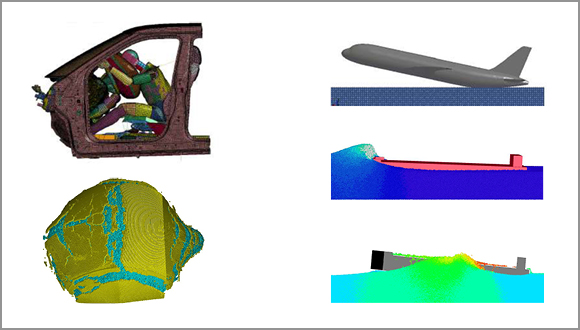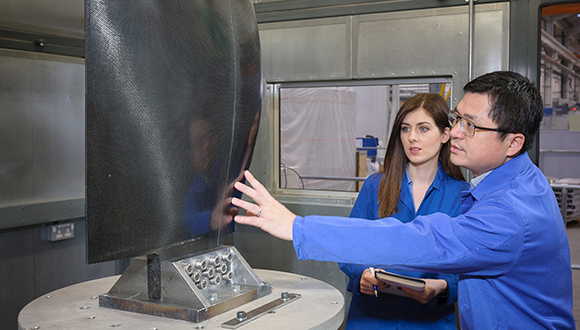Brunel University London is proud to offer a Lightweight Structures and Impact Engineering degree for the future leaders of industry.
Programme
Located just outside the City of Cambridge at the NSIRC, this Lightweight Structures and Impact Engineering masters degree produces graduates with advanced design and analyse skills devoted to lightweight structures that can support carbon capture and cardon dioxide reduction goals for industries such as transportation, offshore and marine, defence and many more sectors.

Overview
Brunel and NSIRC have been providing graduates to industries like Jaguar Land Rover, Aston Martin, McLaren, and Rolls-Royce for over 15 years. They offer a postgraduate engineering degree programme that focuses on two main areas.
Firstly, the programme aims to help students understand the behaviour of materials and structures under different operating conditions. This includes large or rapid deformation, failure (static and transient), and high strain rate loading (inertial effects, wave propagation and shockwaves). The programme also covers composite construction, advanced composite engineering, and composite structures.
Secondly, the programme teaches students advanced simulation methods (mesh-based and meshfree) and their application to lightweight structural design. This is crucial because as industries like aerospace and automotive race to find novel solutions that meet the needs of structural integrity, structural engineering and impact response under extreme loading, advanced lightweight structures that have less structural weight need to be designed and analysed in a way that never compromises on safety. The programme also covers advanced composites.
The Masters programme has a number of key features that make it stand out from other programmes. For example, prestigious scholarships are available for students. The programme is industry-based and delivered at NSIRC (Cambridge), providing access to specialist equipment and CPD (Continuing Professional Development) training opportunities through TWI (CSWIP). Internship and placement options are also available.
The programme is accredited by NAFEMS (International Association for the Engineering Modeling, Analysis and Simulation Community) for Finite Element Analysis training and is aligned with Engineering Council accreditation. It is taught in condensed blocks to support full-time/part-time study. Students also get to work on industry-led dissertation projects, which provide significant networking opportunities through direct contact with the industry at NSIRC and contribution to NSIRC annual PhD conference. Finally, the programme provides students with a laptop that has full access to engineering software for the duration of their studies.
Delivered in blocks that run across two week periods, with exceptions, students will also gain the benefit of extra tutorial support via timetabled self-study time.
For students that may not have a direct mechanical engineering background, a formative study block in structural mechanics and stress analysis will provide appropriate support.
To encourage group achievements and nurture the experience of working collaboratively towards goals, working in groups will for a part of the programme where students will take personal responsibility for learning.
Group design projects will be student-led and supported by industry connection with TWI.
This will develop the ‘soft’ skills of graduates towards communication, problem-solving, planning, and project management, while also giving students of the programme vital experience at dealing with real complexities of working within a professional design team.
Students of this course have an excellent opportunity to undertake an internship or placement after completion of the taught modules and the dissertation.
From September, the course can be studied 1 year full-time, 2 years part-time or 24 months full-time with placement.
 Year 1 Compulsory Modules
Year 1 Compulsory Modules
Note that all modules can be subject to change.
- Advanced Transient Simulation Methods
- Applied Continuum Mechanics 1: Fundamentals
- Applied Continuum Mechanics 2: FEA
- Composite Materials and Structures
- Fracture Mechanics and Fatigue Analysis
- Impact and Crashworthiness
- Metallurgy and Materials
- Dissertation
Optional Modules
- Automotive Integral Vehicle Structures
- Thin-Walled Structures
Teaching and Learning
An engaging learning environment is achieved through specialist lecture modules (assessed and non-assessed), including software training and invited industry speakers. Online self-study training videos will supplement and enhance your learning experience. This includes access to CSWIP training opportunities.
The industry-supported, student-led Group Design Project provides training in problem solving and project management as well as experience in dealing with the complexities of working within a design team. Your Individual Research Project (thesis) allows you to deepen your knowledge in a specific subject.
Assessment and Feedback
Applied assessments and examinations help prepare you to successfully submit your individual dissertation. You’ll be given opportunities for experiential learning in project management and working individually (and as a team) on an initially unfamiliar problem to improve your communication skills.
You will develop your communication skills through technical report writing, oral and poster presentations.